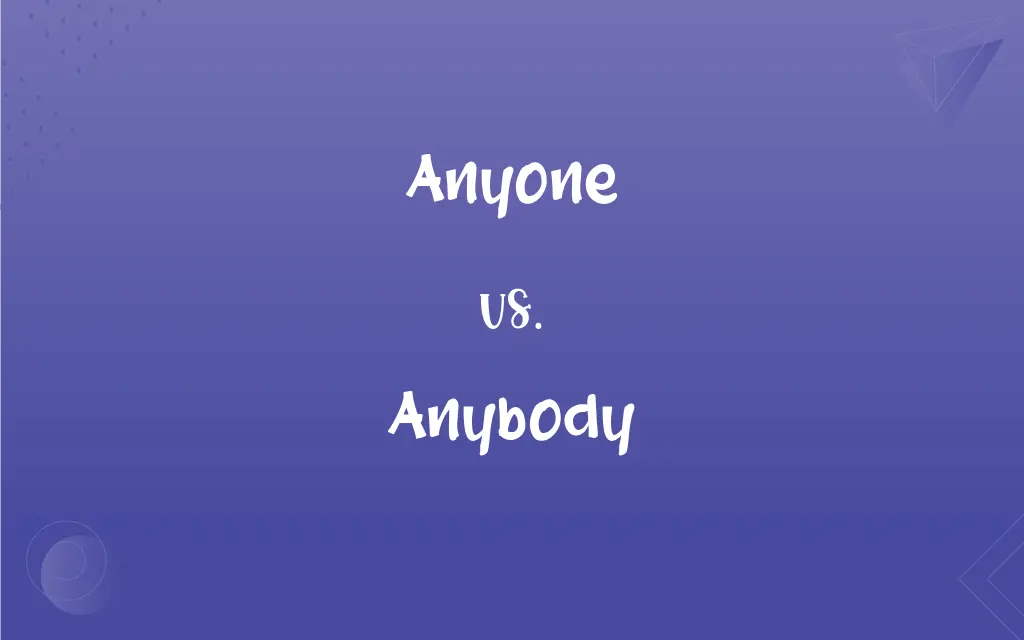Anyone vs. Anybody: What's the Difference?
By Janet White || Updated on November 10, 2023
"Anyone" and "Anybody" are interchangeable, both meaning any person or whoever, without restriction on identity.

Key Differences
"Anyone" and "Anybody" are essentially synonyms in English. Both of these pronouns are used to refer to any person or random individual without specifying who. They are general terms and can refer to an unlimited set of people.
Both "Anyone" and "Anybody" are indefinite pronouns and are used in questions and negative statements and after if/whether and verbs/prepositions expressing absence or lack. They both imply no limitation or discrimination is being made.
The usage of "Anyone" and "Anybody" doesn't change the meaning of a sentence; they are completely interchangeable. However, "anyone" may sound slightly more formal than "anybody," but this distinction is very subtle and not recognized by all speakers.
In context, "Anyone" and "Anybody" are used when the identity of the person referred to is unknown or irrelevant to the context. They're inclusive, implying all individuals within the scope of what's being discussed.
Both "Anyone" and "Anybody" can be used in virtually any context where a non-specific individual is being referred to. Their usage is common and understood globally wherever English is spoken, regardless of regional differences.
ADVERTISEMENT
Comparison Chart
Meaning
Refers to any person or whoever
Refers to any person or whoever
Formality
Slightly more formal
Slightly less formal
Usage in Sentences
Used in questions, negatives, etc.
Used in questions, negatives, etc.
Contextual Limitation
No limitation on who it refers to
No limitation on who it refers to
Interchangeability
Can be replaced with "anybody"
Can be replaced with "anyone"
ADVERTISEMENT
Anyone and Anybody Definitions
Anyone
Anyone: any person at all.
Does anyone have an answer?
Anybody
Any person, no matter who.
Can anybody help me?
Anyone
Anyone: used in questions to ask for a response from any individual.
Has anyone seen my keys?
Anybody
Whoever or anyone.
The secret could be discovered by anybody.
Anyone
Anyone: whoever.
Anyone can join the club.
Anybody
Used in negative sentences to indicate no person.
There isn't anybody in the office.
Anyone
Anyone: any person, without discrimination.
The program is open to anyone interested.
Anybody
Any person indiscriminately.
Anybody is welcome to attend the event.
Anyone
Anyone: used in negative statements indicating the lack of a person.
There wasn't anyone at the meeting.
Anybody
Used in questions to request a response from any person.
Is anybody there?
Anyone
Any person; anybody.
Almost anyone can change a light bulb.
Anybody
A person of consequence
Everybody who is anybody was at the reception. See Usage Notes at anyone, every, he1.
Anyone
One taken at random rather than by selection; anybody. [Commonly written as two words.]
Anybody
Any one out of an indefinite number of persons; anyone; any person.
Anybody will do.
Is there anybody inside?
Anybody
(informal) A person of some consideration or standing.
Everybody who wants to be anybody will come to Jake's party.
Here one isn't anybody, if one doesn't dance like Travolta.
Anybody
Any one out of an indefinite number of persons; anyone; any person.
His Majesty could not keep any secret from anybody.
Anybody
A person of consideration or standing.
All the men belonged exclusively to the mechanical and shopkeeping classes, and there was not a single banker or anybody in the list.
FAQs
Can "Anyone" refer to more than one person?
No, it refers to any single individual, but implies any number of individuals in the group.
Can "Anyone" and "Anybody" be used in questions?
Yes, both are commonly used to refer to any individual in questions.
Are there contexts where "Anyone" is preferable to "Anybody"?
No, they're interchangeable, though "anyone" may sound slightly more formal.
Is "Anyone" more formal than "Anybody"?
Slightly, but the difference is negligible in modern usage.
Are "Anyone" and "Anybody" the same?
Yes, they are synonyms and interchangeable.
Can "Anybody" be used in formal writing?
Yes, it's acceptable, though "anyone" might be slightly more common.
Is there a difference in plural form for "Anyone" and "Anybody"?
Neither has a plural form; they both refer to any single person.
Does "Anyone" imply inclusivity?
Yes, it doesn't exclude any individual.
Can "Anybody" start a sentence?
Yes, like "Anybody can see the solution."
Are there idioms involving "Anyone"?
Yes, like "anyone's guess."
Can "Anyone" be used for non-human entities?
No, it refers specifically to people.
Is "Anybody" casual in tone?
It can be considered slightly less formal than "anyone," but is used in various settings.
Do "Anyone" and "Anybody" have different origins?
No, they both come from Old English "ānig" (any) and "bodig" (body).
Can "Anyone" be used after prepositions?
Yes, like "Is this seat free for anyone?"
Is "Anyone" used in legal contexts?
Yes, it's used to refer to any individual without specificity.
Is "Anybody" appropriate in academic writing?
Yes, though "anyone" might be slightly preferred due to its formal tone.
Can "Anybody" be used in negative statements?
Yes, like "He doesn't know anybody here."
Is "Anyone" singular or plural?
It's singular, but refers to any one person in a group.
Does "Anybody" require a specific verb form?
It's singular, so it typically requires a singular verb form.
Can "Anybody" imply a lack of specificity?
Yes, it refers to any person without indicating a specific individual.
About Author
Written by
Janet WhiteJanet White has been an esteemed writer and blogger for Difference Wiki. Holding a Master's degree in Science and Medical Journalism from the prestigious Boston University, she has consistently demonstrated her expertise and passion for her field. When she's not immersed in her work, Janet relishes her time exercising, delving into a good book, and cherishing moments with friends and family.







































































